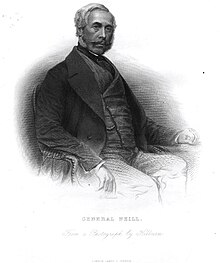James George Smith Neill
| James Neill | |
|---|---|
 |
|
| Born |
27 May 1810 Swindridgemuir, Scotland |
| Died | 25 September 1857 (aged 47) Lucknow, British India |
| Allegiance |
|
| Service/branch | Madras Army |
| Years of service | 1827–1857 |
| Rank | Brigadier-General |
| Battles/wars |
Second Burmese War Crimean War Indian Rebellion of 1857 |
James George Smith Neill (27 May 1810 – 25 September 1857) was a Scottish military officer of the East India Company, who served during the Indian rebellion of 1857. He was infamous for the indiscriminate killing of native Indians during the uprising. His father was Colonel Neill.
Neill was born at Swindridgemuir, near Dalry, Scotland and educated at the University of Glasgow. Entering the service of the British East India Company in 1827, he received his lieutenant's commission a year later. From 1828 to 1852 he was mainly employed in duty with his regiment, the 1st Madras Europeans (of which he wrote a Historical Record), but gained some experience on the general and the personal staffs as D.A.A.G. and as aide-de-camp. In 1850 he received his majority, and two years later set out for the Second Burmese War with the regiment. He served throughout the war with distinction, became second-in-command to Cheape, and took part in the minor operations which followed, receiving the brevet of lieutenant-colonel. In June 1854 he was appointed second-in-command to Sir Robert Vivian to organize the Turkish contingent for the Crimean War.
Early in 1857 he returned to India. Six weeks after his arrival came the news that all northern India was aflame with revolt (see the Indian rebellion of 1857). Neill acted promptly; he left Madras with his regiment at a moment's notice, and proceeded to Benares. As soon as he arrived on 3 June, he preemptively disbanded the local native regiment. A regiment of Sikhs stationed at Varanasi, normally considered 'loyal', revolted. They fled after Neill's commanders shot at them, but returned to duty later.
On 9 June, General Neill set out for Allahabad, where a handful of Europeans still held out in the fort against the rebels. General Neill ordered hanging of those suspected of being the mutineers. According to one of his officers, he also allowed his soldiers to kill the "native" people without due process and burn them from their houses. His Sikh forces stationed at Jaunpur revolted upon seeing these massacres. From 6 to 15 June his men forced their way under conditions of heat and of opposition. Neill received his reward in an army colonel and appointment and aide-de-camp to the queen.
...
Wikipedia
